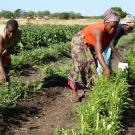This research project seeks to support and strengthen the African indigenous vegetable industry using a market-first approach to overcoming constraints along the value chain, leading to improved production practices, supply, postharvest handling, distribution and consumer acceptance of African indigenous vegetables in Kenya, Tanzania and Zambia.
Key pieces of the project are development of strong public-private sector partnerships that ensure activities support the needs of consumers and markets. These partnerships involve germplasm evaluation, development of sustainable production techniques, seed production/saving techniques, improved market access and building stakeholder capacity through outreach programs at all levels of the African indigenous vegetable value chain.
Project activities will both characterize nutritional attributes of African indigenous vegetable as well as create awareness of health and nutritional benefits of these vegetables through household and market surveys and educational programs about nutrition. The project's international team will bridge information gaps through research and promotional activities cooperating with private sector, farmer groups, government, research and non-governmental organizations to build confidence in African indigenous vegetable production and enhance farmer adoption. Project activities are designed to build capacity of African institutions involved in research and training of extension personnel who serve the farm community. Improved indigenous vegetables will provide nutritional complements to diets.
The approach promotes biodiversity and sound environmental management while providing affordable, edible foods that can be grown/processed locally and are tailored to local dietary needs. Activities will result in improved income generation, new microenterprises across the value chain, improved availability of nutritious African indigenous vegetables for consumption and overall improved quality of life.
This project builds on two previous projects, one in Kenya and one in Zambia.


